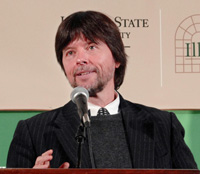BLOOMINGTON, Ill. – Sehaj Sethi expects a bright future working on film sets after graduating from Illinois Wesleyan University.
The senior English-writing major from Inverness, Ill., who is co-head of IWU’s filmmaking organization, 9×9, has already helped to coordinate a film festival for Cinema/Chicago, a not-for-profit multicultural and educational organization, and worked on several projects for 9×9. A producer in her own right, Sethi has also made three independent films.
“In my films, I always like pushing the boundaries and doing things no one else has done because the moment you take people out of their comfort zones, you have their attention,” said Sethi.
For example, in the opening scene of Sethi’s third independent film, Piccavi, which means “I have sinned” in Latin, “a terrible act is combined with beautiful imagery and sound,” said Sethi.
With one line of dialogue, “He weighed 155 pounds,” Sethi presents the viewer with the first subtle clue that something is amiss, using this single phrase to manipulate the viewer’s perception of the lead character’s seemingly innocuous actions.
Both Piccavi and Sethi’s first independent film, Baby Boy America, were chosen as official selections for Cinema/Chicago’s 2007 Future Filmmakers Festival, which accepts film submissions from filmmakers 20 years of age or younger.
Undaunted by sensitive subjects, Sethi based Baby Boy America on a poem by Patricia Smith titled “Skinheads.” The seven-minute film is composed of images relating to this poem.
“When Baby Boy America was showing at the festival, I was shaking and hyperventilating because I didn’t know what the audience would think,” said Sethi.
Sethi’s anxiety about the film’s reception was relieved when two viewers gave a standing ovation while they applauded.
“It hit me like a boulder to my chest. I was stunned that I had impacted some audience members that way,” said Sethi, adding that the moment, which has remained a pinnacle in her life as a budding filmmaker, marked her decision to use cinema as her medium to continue influencing others.
Sethi’s fascination with film began when she was seven during her first trip to the movie theater, to see Jurassic Park with her uncle and cousin. “They were terrified of the film and I was head-over-heels in love with this magic movie world that came to life for me.”
She attributes one of her teachers at William Fremd High School who “was as crazy about film as I was” with sparking her interest in the filmmaking process during her senior year. “Until I took his film appreciation class, I didn’t realize what effect editing, sound editing, camera angles, or lighting had. After that, I was starving for information,” said Sethi.
Upon arriving at IWU, Sethi began working with 9×9 and its founder, Mike Gabriele, class of 2007. Along with Gabriele, Sethi researched and compiled filmmaking equipment for the group.
More
 BLOOMINGTON, Ill. – Illinois Wesleyan’s University Librarian Karen Schmidt was awarded the Jean Anderson Downtown Improvement Award by the Downtown Bloomington Association and the City of Bloomington in recognition of her contributions to the downtown.
BLOOMINGTON, Ill. – Illinois Wesleyan’s University Librarian Karen Schmidt was awarded the Jean Anderson Downtown Improvement Award by the Downtown Bloomington Association and the City of Bloomington in recognition of her contributions to the downtown.